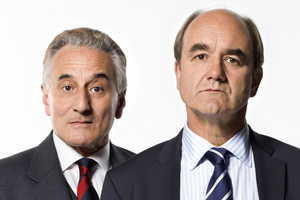David Haig and Henry Goodman interview
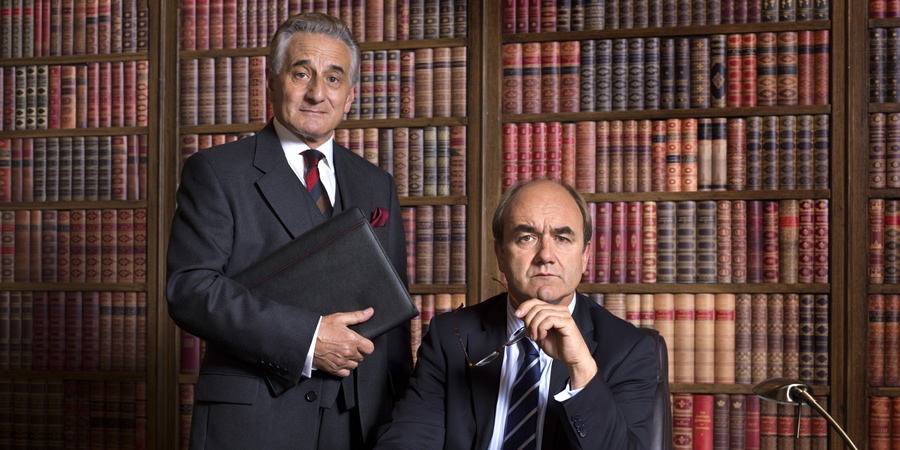
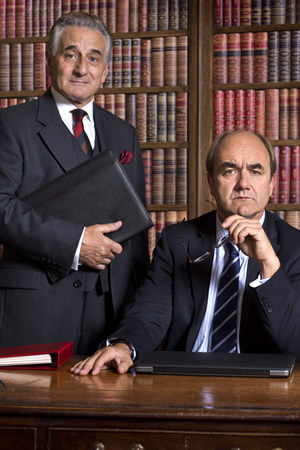
The lovely and well-spoken Henry Goodman and David Haig kindly gave up some of their valuable time to talk to British Comedy Guide about the brand new series of Yes, Prime Minister. Here's what we discussed...
Hi Gents. Could we start by asking you to introduce this revival?
Henry: Certainly. I play Sir Humphrey Appleby and I assist the Prime Minister - the famous Jim Hacker - played by my dear colleague David Haig here. What happens is we go off to Chequers for a weekend. Sir Humphrey has encouraged Jim not to invite certain members of the Government so he can manipulate him to take part in a deal. I don't want to give everything away, but it's a deal that will transform his future and save Britain.
David: And Europe!
Henry: Indeed. Jim then discovers Humphrey has his own nefarious reasons for wanting to do a deal... and the engine of the show takes off. I think it's right not to give away everything, because the joy is that Humphrey has his own reasons for doing it, but the Prime Minister says 'we can't possibly do that, but how do we get out of the problem?'
Then, actually, that becomes one of the least significant problems, because a pile of others - the BBC, Scottish nationalism and the various requests of foreign diplomats - all pile up on top of saving Britain and saving his job. The six separate episodes all happen over a short time period in the Chequers retreat.
David: The origins of this project is that we - Henry and I - played the two characters in the stage version about three years ago when it first opened at Chichester, a show which we then took to the West End. At that time we had no knowledge that it would ever become a televised series and it was fully two and a half years later that Jonathan Lynn - who is one of the co-writers of course, with Antony Jay - rang us up and said 'how about this... we're going to televise it'.
We were of course very excited by the challenge and it's been fascinating doing the televised version, having previously done the stage version. What you do with the energy we were pouring out into these thousand seaters when you come into a compressed studio, it's very interesting.
Yes, Prime Minister is obviously one of Britain's best loved sitcoms, and reviving it could have gone wrong. When you were approached about the initial stage show revival were you hesitant at all?
David: In my head I had said 'yes' before I'd even opened the envelope to read the script. It would have had to have been an appalling script for me to say no. It was so exciting.
Henry: No question about it, how often in your career do you get an offer like that? People often say 'but you've inherited these big shoes', but the opportunity to be believed in as actors to step into those shoes, to trust your own instincts, was thrilling.
Immediately after the first week of 'ok, we're going to do it', the 'Oh my God, what have I taken on' did kick in... because we realised what we've got to live up to, and that we'd have to get inside these brilliantly structured scripts with fast moving dialogue, pressured situations, and stuff that. It's like Centre Court doubles tennis.
TV is a mass medium - did you still have no hesitancy in saying 'yes' when the TV project was mooted?
David: Absolutely. Like all of these things, you hear the message that it might happen and then it's weeks, nay months later that it is confirmed, so you go through a sort of limbo period where everyone is hoping to do it... there was certainly never a question of not wanting to do it. Honestly, I think as Henry has touched upon, it's a not a lack of humility that one is grabbing at these roles, it's just simply because they are beautifully written parts and it is funny stuff.
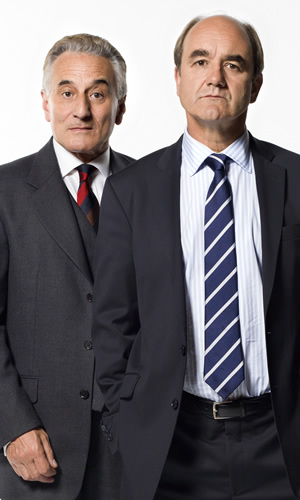
The TV show shares some parts of the script with the stage version. Did you remember those bits, or did you have to start again from scratch?
Henry: Some, yes, did come back, but because of timings and such like it's not the same scripts as the stage show. Great juicy things are gone, but you've still got the faith that this is remarkable material, it's just been hugely re-shaped. The changes and additions were also made to give integrity to each episode - a half-hour journey that is self-sufficient. Even though they link together in the momentum of the story, each one stands alone.
David: Yeah, some of it did come back again, but what was interesting was I thought the stuff from the stage play might be the easiest section of the script to do this time round on television, but I found the extra material easier than the stuff I had a subliminal memory of. With the new material it was like doing a first preview in the theatre - you're really acutely aware of how it develops and shifts, and therefore you ride the laugh and move on. Whereas, with the stage stuff, you've got previous expectations that really can be destructive.
Henry: But it is another liberating and exciting challenge - it's like grabbing the reins of the chariot, because you come out and people love these characters and there's an expectation. With the stage version, after a while of doing it, you knew there was a laugh there and there and there, but with the television version you couldn't just assume it would be the same.
So did any of the laughs change?
David: Yeah, there were laughs that existed in the stage play that didn't on TV, and there were lines that worked better and got a bigger laugh this time.
Henry: And there were other lines you didn't even know there was a laugh there, but it happened on telly because the camera went 'bang' on somebody's reaction, and that led to fantastic laughs. The rhythms change - it was really exciting.
The other thing that is really fascinating with television is that, because there are six cameras, you can be doing whatever you think, but if they don't cut to you and don't see you, sorry it's gone. On stage, people are watching the 'frame' and, yes, you can guide their focus and that sort of thing, but they can see everybody all the time... on the TV set, it depends on what the director wants to do, and so you learn - and I must say I learnt a lot from David on this - you learn to try to be aware of what decisions they're making and how they want to tell the story electronically. The highly technical pressured nature of the live recording in front of the audience is part of the thrill of the challenge.
Great stuff. The Thick Of It was on TV not too long ago. Has that not taken over the political satirical sitcom mantle from Yes, Prime Minister now?
David: Surely there is room for both? They're both very clever, very funny character based political satire. They both deserve space. They come from different angles, and have different qualities, but I think they should both co-exist.
Good answer! So, aside from Yes, Prime Minister what are you up to next?
Henry: I'm going to be very present in various media, as all the stuff I've been doing is coming out shortly at about the same time. I will be playing Henry Kissinger in Nixon's The One, a Sky series which comes out about March or April, and I'm doing a radio comedy series called Find The Better Partner For You. I don't start doing a major stage play until we re-do Arturo Ui, which is being set up now to come into the West End.
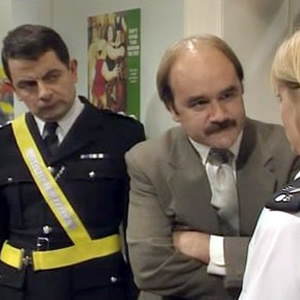
David - we love, love, love your character of Inspector Grim in The Thin Blue Line (pictured). You're now working with writer Ben Elton again, this time you'll be playing a character called Gerald in The Wright Way?
David: Yeah, it's kind of Grim's first cousin I'm about to play. Actually, he's not really very similar - he's much broader. I suppose, because Gerald will be the fulcrum, there's more space for him to be a broader more three dimensional guy. I like to think he is Grim's first cousin though - that he wanted to be a copper, but has ended up in Health & Safety.
Is it a coincidence you're doing two live audience sitcoms this year?
David: I think there is a real feeling amongst the TV networks that, whilst there are so many successful shows like Getting On, The Thick Of It and such like, shows where a camera follows you around the room, and they are fantastic in their own right, we also shouldn't forget front foot energy, live audience comedy - that is an incredibly powerful tradition we've got as a country comically. Look at Miranda and the success she is having with that. I think it's not actually a coincidence that I'm doing two because I think there is a renaissance.
Yes, Prime Minister starts on 15th January at 9pm on Gold.

